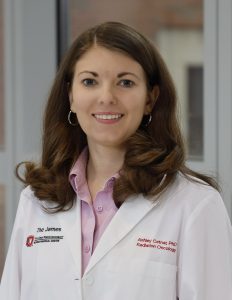New Oral Examiner Drawing on Her PhD Experience
By Rodney Campbell, ABR Communications Manager
2024;17(6):10
On her way to earning a PhD in education from Ohio State University, Ashley Cetnar, PhD, MS, concentrated on learning about oral exams. She started putting that experience to use as an ABR oral examiner for medical physics for the first time earlier this year.
Looking back on her experience at OSU, where she earned her degree in December 2020 and is now an associate professor, Dr. Cetnar is thankful for the opportunity to have studied the methodology before starting with the ABR.
“Conducting a literature review on oral examinations was really helpful for knowing the history, background, and the rationale for why you’re doing the assessment,” she said.
Coordinating mock exams was an important part of her learning and remains vital to what she does as an educator. As a first-time examiner, she was able to draw on that experience. She also wants to get a better idea of how her colleagues are performing their duties during future exams.
“I only had the perspective of myself and the examinees that I interacted with,” she said. “It would be interesting to observe other examiners to see if the observations that we saw in the research of oral exams on the mock level are transferable to the real examination.”
Regardless of discipline, every oral examiner has one thing in mind: ensuring that candidates are safe to practice independently. There are no trick questions, and examiners treat the process as a conversation between colleagues, simulating a real-world environment.
“Your goal is to make sure that you understand what they actually know,” Dr. Cetnar said. “This is every candidate’s opportunity to shine and show the things that they have worked toward professionally.”
Being an examiner carries a great deal of responsibility. After becoming a volunteer in 2022 and going through extensive training, Dr. Cetnar was still nervous when she put on the headset to examine candidates.
“It was intimidating because it’s the first time that you have an opportunity to discern whether a candidate knows enough to meet that bar for our profession,” she said. “You prepare as much as you can, but even as an examiner, you’re nervous. Being an examiner is a tremendous responsibility.”
Despite the nerves, her first experience as an examiner went well. Matthew Podgorsak, PhD, chair of the ABR Board of Trustees and a member of the Board of Governors, helped recruit Dr. Cetnar and watched her performance during the spring administration.
“In observing her as she examined her first two candidates in April, I was able to confirm that, as expected, Dr. Cetnar exudes an interaction style that nicely supports the best practice in oral exam administration: providing candidates with an environment that enables them to fully communicate their knowledge and experience during an exam session,” he said. “I certainly look forward to inviting Dr. Cetnar to examine again in the very near future.”
Dr. Cetnar discovered her calling at Grove City College in Pennsylvania, where she earned a degree in applied physics. She went on to earn a master’s in medical physics at Vanderbilt University.
“It was by chance that I decided to major in physics,” she said. “But once I was in that scientific community, it was very supportive. Being welcomed was motivating for me to continue on to earn a physics degree.”
Some students only take STEM classes when required. Dr. Cetnar took that as a challenge to become a better physics instructor, taking part in Vanderbilt’s Center for Teaching. In addition to her PhD in education, she also has a certificate in health professions education from the University of Louisville and a public management certificate from Ohio State, where she’s now pursuing a master’s in public management and leadership. It’s a well-rounded education.
“A lot of people don’t like STEM classes because they think that they’re hard,” she said. “While the subject matter may be challenging, it’s usually correlated to poor instruction. When people think about their least favorite teacher, it might be a science teacher or a physics teacher. That was my primary motivation for learning more about what goes into good teaching.”
Teaching classes keeps her in touch with what aspiring medical physicists know. She’s also encouraged by what she’s seen as an examiner.
“It’s great being able to interact with the next generation of medical physicists who are going to do awesome things for our field,” she said. “It was really rewarding to be part of that process.”



